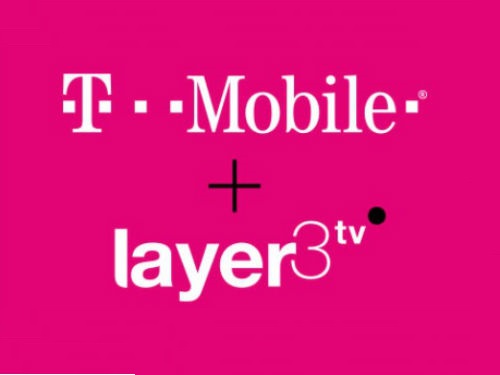T-Mobile: Our Integrated Mobile/Home Pay TV Play Won’t Be a ‘Me-Too’
The smarter way to stay on top of the multichannel video marketplace. Sign up below.
You are now subscribed
Your newsletter sign-up was successful

T-Mobile isn’t announcing pricing and packaging for a pay TV service that will debut sometime next year following its proposed acquisition of Layer3 TV, but execs did drop a few hints about what’s in store… and what isn’t.
RELATED: T-Mobile Inks Deal to Acquire Layer3 TV
“We’re not going to give the world another me-too, copycat skinny bundle loaded with tradeoffs,” Mike Sievert, T-Mobile’s COO, said on today’s conference call, soon after the deal was announced. “They [consumers] don’t want to be stuck with TV on a diet. They want the ability to feast if they want to."
He said those coming packages will also be complemented by integrated access to OTT services and new ways to discover content that come from the social media and mobile worlds.
How T-Mobile moves forward next year will certainly skew differently and present options that aren’t completely centered on Layer3 TV’s current strategy, which has been focused on a concierge-style offering with large pay TV packages (with some OTT integrations) teeming with HD (its lineup today has 250-plus HD channels), access to a growing mix of live and VOD 4K content, and a service that runs on its own set-top boxes and relies on professional installs and a fleet of energy-efficient vehicles made by BMW and a few from Tesla that are being used in markets such as Longmont, Colo.
RELATED: Layer3 TV Goes For The Big Bundle
And Layer3 TV’s packages, which include local broadcast channels and a heavy dose of national cable channels, have been deployed on a market-by-market basis rather than on a nationwide basis, and is not being delivered into homes via a pure OTT distribution model that so-called "virtual" MVPDs such as YouTube TV and SlingTV use today, but rather by a more managed approach on how video is prepared and delivered, at least up until the broadband ISP's last mile access network.
RELATED: Layer3 TV: A Different Kind of Animal
After the deal, T-Mobile will continue to support that legacy Layer3 TV product and deliver other packages and services that it can also offer nationally.
The smarter way to stay on top of the multichannel video marketplace. Sign up below.
“We’ll continue to support the current model,” said Jeff Binder, Layer3 TV’s CEO, who will join T-Mobile’s leadership team and head up its integrated efforts in the TV and entertainment areas after the deal is closed. Binder added that all of Layer3 TV’s employees (there are about 200 of them) will be joining T-Mobile and that Layer3 TV’s Denver office will be maintained.
RELATED: Layer3 TV Opens its Denver Headquarters
“We’ll grow that across the country and we’ll add a variety of products that solve these pain points,” Binder said.
T-Mobile is expected to create national, contract-free packages that lean on Layer3 TV distribution rights deals that allow for that, and to extend service to a wide range of mobile and TV-connected devices, including Roku players, Apple TV boxes and smart TV platforms.
“This is about an integrated home and mobile experience,” Sievert said. “We don’t intend to just be the end provider of mobile-only service, though we think mobile is a huge part of this.”
“The offer we will be deploying nationwide from a wireless standpoint is not part of what they [Layer3 TV] do, but it's already contemplated and constructed,” John Legere, T-Mobile’s CEO, explained. “In the meantime, they've got a great, growing business that we'll continue to push forward."
“We’re not going to force customers to go on a diet with a skinny bundle,” Binder said. “We're not going to force customers to take every channel in the universe. We'll find a mix that solves the pain points and build those out to make really terrific products that are going to make our competition sweat, and sweat hard."
Update: Color AT&T, which operates DirecTV Now, an OTT TV service launched last November that now has more than 1 million subs, unimpressed with whatever TV services T-Mobile intends to muster. “Un-original – yet further validation that the industry is dynamic and extremely competitive everywhere you turn,” an AT&T spokesperson said in a statement about the T-Mobile/Layer3 TV deal.
T-Mobile stressed that it will be pushing forward in the pay TV area ahead of its 5G upgrade/transition, and lean on its retail presence (roughly 16,000 stores nationwide) and its access to millions of mobile handsets that run its service.
“The last mile isn’t our issue because we are a nationwide, leading broadband provider even today,” Sievert said, noting that T-Mobile’s network currently delivers an average of 30 Mbps. The company will also take advantage of Layer3 TV’s use of HEVC encoding to keep bit loads down, even for HD and 4K content.
With 5G on the horizon, “the traditional barriers between mobile internet and home internet are falling away,” Sievert added.
He also expects T-Mobile to generate a decent return on its new pay TV service in part using targeted advertising and by taking advantage of efficient acquisition costs and other synergies.
As for the origins of the deal, Legere said T-Mobile and Layer3 TV were brought together by an investor in both companies.
Financial terms weren’t disclosed, but the agreement “is definitely not a material part of our liquidity profile,” J. Braxton Carter, T-Mobile’s EVP and CFO, said. “This is…going to be another example of something that’s going to be highly disruptive, accretive to our business.”
Layer3 TV hasn't released subscriber numbers, but Carter noted that the Denver-based provider is being acquired during its "pre-revenue" phase.
